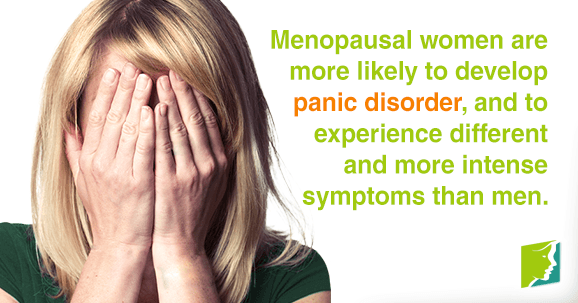Panic disorder can worry even the bravest among us, but having all the facts can make the problem seem much more manageable. Since women find themselves potentially at risk for the condition during menopause, learning more about panic disorder is important. Read on to learn five facts about panic disorder to remember in order to gain peace of mind and seek relief today.
Some Symptoms Are More Prevalent in Women
Women, particularly those experiencing panic disorder and menopause simultaneously, are not only more likely to develop the condition, but also to have different, more intense symptoms than men. Concretely, there is a greater prevalence of shortness of breath, faintness, and the feeling of being smothered accompanying each panic attack, as opposed to lessened symptoms or lesser frequency in male study groups.
Hormonal Disorder Is Often to Blame
Outside factors, such as increased stress, are rightly considered as possible triggers for panic disorder. During menopause, however, panic disorder can be due to hormonal imbalance, because low levels of estrogen can raise blood pressure and blood sugar levels, resulting in a panic attack. Progesterone, another sex hormone that undergoes great flux during this period, also has a calming effect on the body, so when its levels dip too drastically, it can negatively affect mental health.
Misdiagnosis Is More Common Later in Life
Unfortunately, hormonal imbalance is still often overlooked among the general medical community as a root cause for this condition, which explains in part the meager 50% success rate of conventional anxiety treatments. Research continues to support the link between panic disorder and menopause, and with time, knowledge of the connection should become more widespread.
Panic Disorder Is Linked to Depression
Those who have dealt with chronic panic attacks will know that the onset of symptoms seems to put all the senses into overdrive, so a direct association is not always made between this disorder and depression. The two do, however, often coexist, and both are potential side effects of menopause. If a woman is experiencing one, the other should also be treated accordingly, or steps should be taken to prevent it.
Panic Attacks Are Not a Loss of Control
Some who suffer recurring bouts of panic attacks report a terrifying sensation of helplessness, but it's important to remember that no one is truly out of control during an episode. All senses, in effect, are actually heightened for personal protection, as the body feels the need for utmost alertness and awareness of surroundings. This knowledge alone can be helpful to remember to calm panic disorder in the heat of moment.
By understanding panic disorder in all its many facets, the condition loses its dizzying mystery, making it manageable and easier to get under control. Armed with the facts above, talk to your doctor or a loved one today about getting the treatment needed to start making panic disorder and menopause symptoms both things of the past.
Sources
- Leskin, G.A. & Sheikh, J.I. (2004).Gender Differences in Panic Disorder. Psychiatric Times. Retrieved from http://www.psychiatrictimes.com/articles/gender-differences-panic-disorder
- National Institute of Mental Health (NIMH). (n.d.). Women and Depression: Discovering Hope. Retrieved October 21, 2013, from http://www.nimh.nih.gov/health/publications/women-and-depression-discovering-hope/index.shtml
- Scheinbaum, S. (2012). How to give Clients the Skills to Stop Panic Attacks: Don't Forget to Breathe. Retrieved October 22, 2013, from http://www.jkp.com/blog/2012/06/article-dr-sandra-scheinbaum-6-myths-about-panic-attacks


